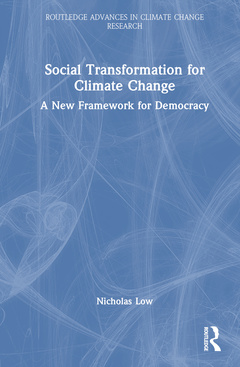Description
Social Transformation for Climate Change
A New Framework for Democracy
Routledge Advances in Climate Change Research Series
Author: Low Nicholas
Language: English
Subjects for Social Transformation for Climate Change:
Publication date: 12-2023
· 15.6x23.4 cm · Hardback
Publication date: 12-2023
· 15.6x23.4 cm · Paperback
Description
/li>Contents
/li>Readership
/li>Biography
/li>
This book argues that social transformation is both necessary and possible if democracies are to respond effectively to the climate crisis without social collapse.
Climate transformation and social transformation are intimately connected. Understanding how to address climate change requires a historical approach both to the climate and to our collective institutions of humanity. Drawing on the works of Karl Polanyi and Thomas Piketty, Nicholas Low traces the course of historic social transformations from Britain, Russia, and Australia to highlight key commonalities: social crisis, the widespread sense by those in power that ?something has to change?, the shift in ideology, and the political champions that drove the change. Within its international scope, the book delves deeper into specific instances of inequality and poverty from Britain, the USA, Australia, and the Global South. It shows how these examples are connected with the current climate emergency. Finally, the author draws together all the evidence from past transformations to outline how a new social democratic transformation could generate a better future, creating the social solidarity necessary to cope with the climate crisis.
This book will be of great interest to students and scholars of climate change, environmental politics and policy, political ecology, environmental sociology, and environmental studies more broadly. Its argument is also highly relevant for political actors working towards social and economic transformation.
CONTENTS
Acknowledgements
PART 1 TRANSFORMATIONS
1. Climate Transformation and Social Transformation
2. The Great Transformation
3. The Arrival of Social Democracy in Britain
4. The Neoliberal Regression
5. Communism to Capitalism
6. The State and Civil Society in Transformations
PART 2 THE CLIMATE TRANSFORMATION
7. Climate Crisis
8. Democracy and the International Order
9. Inequality and Poverty
10. Remaking Democracy for a World of Climate Change
11. Climate Transformation: Action, Actors, and Activists
12. What We Can Learn from the Past
Bibliography: Key Readings
Index
Nicholas Low is a Professorial Fellow of the University of Melbourne. After qualifying as an architect at the Architectural Association in London, he took his Master of Urban Planning degree at Strathclyde University, Glasgow. Tutored by sociologist, Dr Sean Damer, he found that there was much more to town planning than drawing patterns on maps. At the core of planning lay political doctrines and institutions. Nick then worked as a city planner in the outer London Borough of Hillingdon. After moving to Melbourne University in 1974 as a lecturer in planning, he studied the evolution of cities, planning, and environments and their political contexts – with growing concern for the substitution of the market and politicians for professional planning. In the 1990s turning towards environmental planning, he found that democracies were failing to prepare for an overheating world. In 1997 he convened the first international conference on environmental justice (Environmental Justice: Global Ethics for the 21st Century). He has authored, co-authored, or edited 11 books including Planning, Politics and the State (sole author, 1991), Justice, Society and Nature: An Exploration of Political Ecology (1998 with Brendan Gleeson), The Green City: Sustainable Homes, Sustainable Suburbs (2005, with Gleeson, Green, and Radovic), Transforming Urban Transport: The Ethics, Politics and Practices of Sustainable Mobility (ed. 2013), and Being a Planner in Society: For People, Planet, Place (sole author, 2020). His work is also published in many international refereed journals and book chapters.
These books may interest you

Local Climate Change and Society 172.36 €



